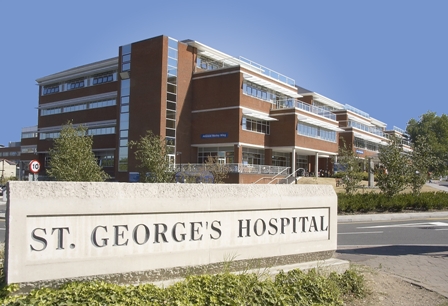St George’s CQC inspection report published
St George’s University Hospitals NHS Foundation Trust has been given an overall rating of Inadequate by the Care Quality Commission (CQC).
The CQC’s report – published today (Tuesday, 1 November) – follows an inspection of services provided by the Trust in June 2016.
The CQC has also recommended St George’s be put into special measures, which would mean the Trust being able to access support to help deliver the required improvements.
Sir David Henshaw, Interim Chair at St George’s since the end of March 2016, said:
“We have a new leadership team in place, and real progress has been made since June. However, as we’ve always said, there will be no quick fix to the problems we face.
“Many of these challenges are due to very poor Board and senior management decisions in the past, and a failure to tackle the big challenges head on. We owe it to our staff and patients to make St George’s better again, and the CQC’s report is a key part of this improvement journey.”
How we rated:
- The Trust’s overall rating was Inadequate. Both St George’s Hospital and Queen Mary’s Hospital (and the community services the Trust provides) were rated as Requires Improvement.
- The Trust has been rated as Inadequate for being safe and well-led, and Requires Improvement for being effective and responsive. The Trust was given a rating of Good for being caring.
- The Trust is also required to meet CQC requirements set out in a Warning Notice which relate specifically to: providing safe and fit premises at St George’s Hospital; obtaining consent under the Mental Capacity Act; good governance and the fit and proper person requirement.
St George’s Chief Executive, Simon Mackenzie, discusses CQC report (1 November 2016):
Tackling the challenges we face:
Since June, we have made significant progress in a number of areas:
- The CQC confirmed our own concerns about the hospital buildings and estate at St George’s (Tooting site). However, since June, we have re-started the estates maintenance programme previously abandoned; refurbished two operating theatres; moved a number of outpatient services off site; and our renal patients are in the process of being transferred to new and improved accommodation.
- We have also taken action to reduce the risks associated with fire safety, which have been assessed by the London Fire Brigade and deemed to require no further action. The risk of water contamination is also reduced due to a preventative flushing regime, and special filters are attached to taps in clinical areas.
- The CQC found failings with the way we care for children and young people with mental health problems. We have taken steps to improve the situation – including increased safeguarding training for staff – and the potential ligature points identified on one ward during the CQC’s inspection in June were removed within hours of being detected.
- The Trust has invested £1.3 million in new computers and equipment to stabilise our IT systems, which the CQC confirmed was not fit for purpose and made the lives of staff difficult.
- We have improved the experience of patients accessing outpatient services, and a new call centre is helping us manage demand much better. Our Emergency Department (ED) is currently one of the best performing in London, and access to cancer services is also much improved.
- We have recently appointed a new Chief Nurse and Director of Infection Prevention and Control, as well as three new Non-Executive Directors. These permanent appointments strengthen the Trust Board, and will provide greater stability for the organisation going forward.
Building on the positives:
There are a number of positives in the report:
- Our 9,000 staff were found to be caring, and doing a good job in challenging circumstances.
- Our renal unit at St George’s was praised for delivering some of the best survival rates and outcomes for patients in the country.
- The care provided by our maternity and neonatal teams showed a real drive to improve the experience of families accessing our services; and the clinical outcomes achieved by our specialist medical and surgical teams were also complimented.
Professor Simon Mackenzie, Chief Executive of St George’s, said:
“St George’s has many great and caring staff. It is thanks to them that the Trust does so much that benefits patients, and I am pleased the CQC has recognised this. Our staff could do even more if we could make their working lives easier. This is why we are improving the buildings they work out of, and the systems they use every day – which will ultimately benefit patients as well.”
For more information, please contact our press office on 020 8266 6128 or email Chris Rolfe, Associate Director of Communications (chris.rolfe@stgeorges.nhs.uk).
St George’s University Hospitals NHS Foundation Trust is one of the largest healthcare providers in the UK. Its main site, St George’s Hospital – one of the country’s principal teaching hospitals – is shared with St George’s, University of London, which trains medical students and carries out advanced medical research. As well as acute hospital services, the trust provides a wide variety of specialist and community hospital based care and a full range of community services to children, adults, older people and people with learning disabilities. These services are provided from Queen Mary’s Hospital, Roehampton, 11 health centres and clinics, schools and nurseries, patients’ homes and Wandsworth Prison.


